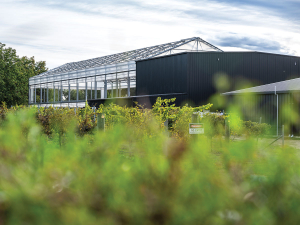Next Generation Viticulture: Capture more light to harvest more grapes
Transforming canopy management systems to maximise sunlight could increase vineyard profitability without compromising wine quality, says researchers.
 The New Zealand Wine Centre’s Experimental Future Vineyard, to be operated by Plant & Food Research, has a retractable rain shelter and capability to simulate climate change. Photo Credit: Plant & Food Research, Wara Bullôt
The New Zealand Wine Centre’s Experimental Future Vineyard, to be operated by Plant & Food Research, has a retractable rain shelter and capability to simulate climate change. Photo Credit: Plant & Food Research, Wara Bullôt
A large part of the Marlborough Research Centre’s success over the past 40 years is the communication carried out by those that worked there, a leading scientist says.
The centre, which was established in May 1984, is now a hub of grape and wine research and education, with Plant & Food Research’s Viticulture and Oenology group, New Zealand Winegrowers’ sustainability team, and Bragato Research Institute all onsite. The New Zealand Wine Centre is nearing completion of a future-focused vineyard lab, to be officially named and opened on 26 July. It also retains the Grovetown Park campus, and uses the 10-hectare Rowley Crescent vineyard for research.
Dr Mike Trought, who was the officer in charge when the centre was founded, then a regional scientist with MAF Technology, says it began because of the vision of people like Bob de Castro, who put his own money behind the initiative. Funding also came from MAF, the DSIR, and the then three councils. Funding from Marlborough District Council continues today, and has been an essential part of the centre’s growth, enabling a smaller amount of funding to be leveraged into much larger projects with external backers. Mike says research in the early days focussed on a wide range of sectors, from work on cherry physiology to the introduction of pasture species at Molesworth. There was even work on grape vine irrigation and diseases. “Our team was enthusiastic and dedicated.” His job was to “collaborate with as many people as I could and encourage them to work in Blenheim”, which extended to putting them up in the spare room of his house.
The early years of collaboration and communication set the centre up, and a review of it after five years confirmed its success, Mike says. The centre become the contact point on any science matter for the public, aided by a monthly article in The Marlborough Express and the distribution of annual reports and other material as widely as possible, with the annual report going to as many people overseas as it did in New Zealand.
Gerald Hope, who joined MRC as chief executive in 1991, recently stepped down, with John Patterson to take over the role from 1 July. “New Zealand’s future is aligned to developing new technologies, and sustainable growing systems that minimise environmental impacts and mitigate the impact of climate change”, John says.

Trade is important to our industry, whether it’s because 90% of our wine sales are in international markets, because of…

The end of the year is fast approaching, so here are some thoughts on a few of the significant developments…
Jimmy Stewart is quite literally chipping away at circularity.
A Wine Marlborough Lifetime Achievement Award is “very premature”, say Kevin and Kimberley Judd, nearly 43 years after they came…
Wine tourism has evolved into a sophisticated, diverse and resilient part of the New Zealand wine sector's economy. Emma Jenkins MW talks…